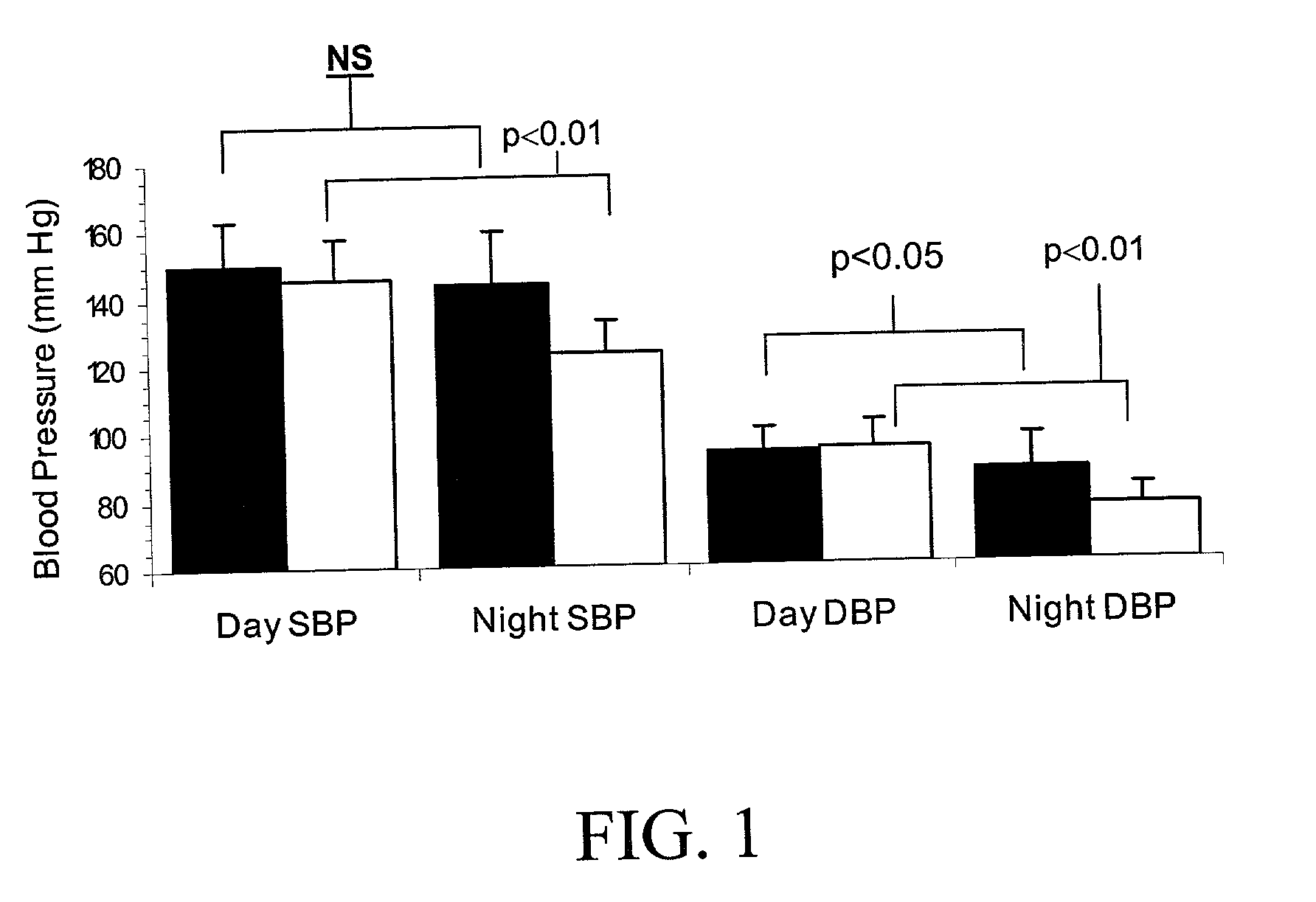Beta-adrenoceptor genetic polymorphisms and obesity
a gene polymorphism and beta-blocker technology, applied in the field of beta-blocker genetic polymorphisms and obesity, can solve the problems of increasing the risk of cardiovascular disease, diabetes, lipid disorders, and some cancers, and the likelihood of response to a specific blood pressure lowering medicine, including beta-blockers, is only 40-70%
- Summary
- Abstract
- Description
- Claims
- Application Information
AI Technical Summary
Benefits of technology
Problems solved by technology
Method used
Image
Examples
example 1
ADRB1 (.beta..sub.1AR Gene) and Obesity
[0037] .beta..sub.1AR genotypes at codons 49 and 389 were determined by PCR and restriction fragment length polymorphism (RFLP) analysis using standard techniques. A total of 89 WISE participants were genotyped at codon 49; 61 WISE participants were also genotyped at codon 389. Data for codon 49 are shown in Table 2 below.
[0038] In vitro and human studies provide evidence that the .beta..sub.1AR polymorphisms are functional. Genotyping of 89 WISE participants at codon 49 of the .beta..sub.1AR revealed significant differences in BMI between Ser49Ser and Gly49 carriers. The data indicates an association exists between the .beta..sub.1AR polymorphism and obesity.
example 2
ADRB2 (.beta..sub.2AR Gene) and Obesity
[0039] Analysis was also performed regarding of the .beta..sub.2AR polymorphisms and obesity in the WISE population. A total of 34 patients were genotyped for the three .beta..sub.2AR polymorphisms. The Glu27 allele is associated with a higher BMI. Mean BMI in the Glu27 carriers is 31.7 kg / m.sup.2, versus 28.8 kg / m.sup.2 in the Gln27Gln group.
example 3
ADRB2 (.beta..sub.2AR Gene) and Hypertension / Coronary Dysfunction
[0040] Polymorphisms of the .beta..sub.2AR were analyzed by haplotype and revealed associations between dipper phenotype in hypertension and .beta..sub.2AR gene. This analysis also revealed a correlation between coronary microvascular dysfunction and the .beta..sub.2AR gene. In these analyses, three chromosomal haplotypes were found: Arg19 / Gly 16 / Glu27 (RGE), Cys19 / Gly16 / Gln27 (CGQ), and Cys19 / Arg16 / Gln27 (CRQ). Data from both studies suggests the RGE haplotype is detrimental (significantly associated with the undesirable phenotype), CGQ is protective (significantly associated with the desirable phenotype), and CRQ is neutral. These analyses were performed using standard techniques as described below.
[0041] Thirty-nine unrelated, previously diagnosed hypertensive patients, ages 35 to 65 years, were enrolled in the study. After obtaining written informed consent, a blood sample was drawn from each patient for determinat...
PUM
| Property | Measurement | Unit |
|---|---|---|
| blood pressure | aaaaa | aaaaa |
| body weight | aaaaa | aaaaa |
| weight | aaaaa | aaaaa |
Abstract
Description
Claims
Application Information
 Login to View More
Login to View More - R&D
- Intellectual Property
- Life Sciences
- Materials
- Tech Scout
- Unparalleled Data Quality
- Higher Quality Content
- 60% Fewer Hallucinations
Browse by: Latest US Patents, China's latest patents, Technical Efficacy Thesaurus, Application Domain, Technology Topic, Popular Technical Reports.
© 2025 PatSnap. All rights reserved.Legal|Privacy policy|Modern Slavery Act Transparency Statement|Sitemap|About US| Contact US: help@patsnap.com

